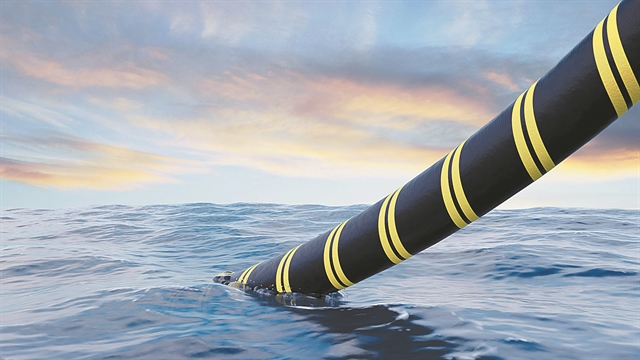The finance ministry has refused to greenlight the payment of €25 million to Greece’s independent transmission system operator (Admie), which form part of the government’s obligations regarding the Great Sea Interconnector project, which, if completed, would connect the electricity grids of Greece, Cyprus and Israel, according to reports.
Newspaper Phileleftheros reported that the finance ministry will not acquiesce to the payment “if Admie does not convince it that the project is progressing well not only at the Nexans factory, but in the sea”.
Nexans is the French company which is manufacturing the cables which are to be laid under the sea to connect the three countries’ electricity grids.
The report added that the finance ministry has issued a written update, stating that the current state of affairs “does not allay concerns” that the interconnector project has stalled.
The ministry reportedly added that that Admie “intends for Cypriot consumers to pay for a cable costing €1.4 billion, even though [Admie], the Greek government, and the European Union – let alone the Republic of Cyprus – are not able to guarantee the cables will be fully laid and operational by 2030”.
Admie had asked the Republic of Cyprus to pay a total of €125 million between 2025 and 2029 – before the interconnector is operational, in effect helping finance the project and ensuring that Admie will have a stable income while investing in the project before the project itself turns a profit.
In the end, a solution to the matter had reportedly been reached, with the Cypriot government set to utilise funds made available to it through the European Union’s emissions trading system (ETS) to pay the required €125m.
However, Admie has now warned the Cypriot authorities that this arrangement may violate the EU’s rules on state aid, and as such has asked the Cyprus energy regulatory authority (Cera) to begin charging Cypriot consumers directly.
These issues were raised at an online meeting on Tuesday night, which was attended by representatives of Admie, Cera, Greece’s energy regulatory authority (Raaey), and the European Commission’s directorate-general for energy.
The stated aim of that meeting was to ensure that “regulatory decisions” be made to ensure the future of the interconnector project, with Admie chairman Manos Manousakis saying after the meeting that “no progress” had been made.
As such, he said, the European Commission has scheduled another meeting for July 23.
He stressed that Admie has “invested €250m in this project”, and that “to continue investing, it requires a stable and secure revenue”.
“There is no one who denies this, not even the regulators. There is simply a process which is being delayed, and we are at long last expecting it to be completed,” he said.
The latest hitch in the project comes amid growing doubts regarding its future, with energy expert Dr Charles Ellinas having earlier said the project had been “interrupted”, and that stakeholders are unsure of its future, “despite assurances” from Admie.
“I am also concerned by the fact that Europe is completely absent from the events,” he added, pointing out that previously, the EU “was the one which promoted the cable through the feasibility studies, allocating €657 million for its implementation”.
In May, Admie, the project’s 51 per cent majority stakeholder and implementing body, was forced to deny that it has plans to build an electricity interconnector to the country’s Dodecanese islands rather than to Cyprus.
The denial came after a report was published in Greek newspaper Kathimerini which suggested that given the financial and geopolitical hurdles faced by the Great Sea Interconnector project, which would connect the electricity grids of Greece, Cyprus, and Israel, a project housed entirely in Greece may be more feasible.
The newspaper had written that Admie and Nexans have been “looking for a plan B to mitigate the effects of the prolonged uncertainty and the threat of cancellation”.
This, it said, is because “there is no longer any visibility regarding the resumption of surveys in international waters, which were stopped last July following Turkey’s reactions”.
“Admie and the [Greek] government are already examining scenarios for managing the impact of the operator’s finances,” it added, writing of high expenses already incurred by the project so far and the possible demands of Nexans, which may amount to a total of €1.4 billion.
It also warned that “the consequences of a final collapse of the project on Admie will be anything but negligible”, with the possibility of the Greek state selling off further shares in Admie not ruled out. At present, the Hellenic Republic is a 51 per cent majority stakeholder.
The reports of Admie and Nexans possibly searching for a way out of the Great Sea Interconnector project came after Admie temporarily suspended payments to Nexans for the manufacture and installation of cables for the project.
At the time, Energy Minister George Papanastasiou had told CyBC the decision was understandable “in the context of the technical, fiscal, and geopolitical risks inherent to the project”, with it having been revealed that payments were suspended after Turkish warships had reportedly “disrupted” seabed surveys related to the project.






Click here to change your cookie preferences